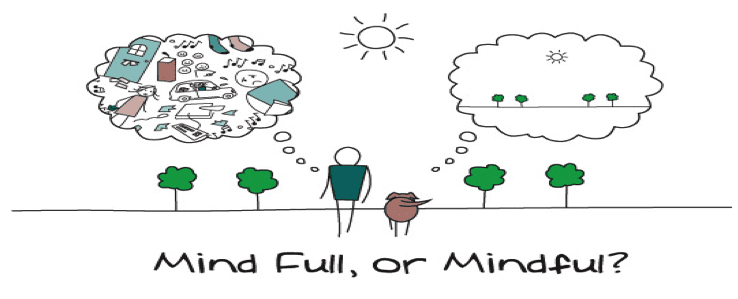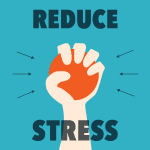
Use Mindfulness for Sustained Motivation
What is mindfulness?
Mindfulness is the practice of bringing nonjudgmental awareness to the present moment. Most of the time our attention is caught up indiscriminately in the ever-changing kaleidoscope of our busy minds – thoughts, emotions, memories, stories, worries, plans, fragments of popular songs, etc. Because the majority of our attention is already engaged, we have very little left to focus on the task at hand.
By using mindfulness, you develop the ability to be present for any given experience just as it is, with full awareness, beginning with breathing and gradually expanding to include sights, sounds, feelings, and ultimately thoughts. Eventually, you learn how to bring mindful awareness to every area of your life. In turn, you improve your level of motivation to fully engage in activities you are involved in. Like other skills, mindfulness can be cultivated and honed, and the more mindful you are, the more you benefit. Mindfulness has no religious or spiritual message or affiliation and can be practiced by anyone, no matter what their beliefs may be.
- “Our findings indicate that a short training program in mindfulness meditation has demonstrable effects on brain and immune function.” – Professor Richard Davidson, University of Wisconsin
- “Productivity rests on focused human attention.” – Assistant Professor Jermey Hunter, Peter F. Drucker School of Management
- “Building mind-fitness with mindfulness training may help anyone who must maintain peak performance in the face of extremely stressful circumstances, from first responders, relief workers and trauma surgeons, to professional and Olympic athletes.” – Associate Professor Amishi Jha, University of Miami
- “It’s fascinating to see the brain’s plasticity and that, by practicing meditation, we can play an active role in changing the brain and can increase our well-being and quality of life.” – Research Fellow Brita Holzel, Harvard Medical School
You can practice and use mindfulness for sustained motivation. The benefits of mindfulness lead to a less stressed and more motivated you!
 Stress reduction: In the last 10 years, numerous studies have demonstrated the robust effectiveness of mindfulness meditation in reducing stress, anxiety, and depression, making it the gold standard among stress-reduction techniques. Since employee stress is one of the greatest sources of lost revenue for businesses, mindfulness can be an essential safeguard for the corporate bottom line. Brain scans of people that practice mindfulness consistently show a shift in activation and gray matter density from the areas of the brain associated with negative emotions like stress, anxiety, frustration, and dissatisfaction to the areas associated with positive emotions like happiness and contentment. Mindfulness practice also reduces levels of the primary stress hormone, cortisol.
Stress reduction: In the last 10 years, numerous studies have demonstrated the robust effectiveness of mindfulness meditation in reducing stress, anxiety, and depression, making it the gold standard among stress-reduction techniques. Since employee stress is one of the greatest sources of lost revenue for businesses, mindfulness can be an essential safeguard for the corporate bottom line. Brain scans of people that practice mindfulness consistently show a shift in activation and gray matter density from the areas of the brain associated with negative emotions like stress, anxiety, frustration, and dissatisfaction to the areas associated with positive emotions like happiness and contentment. Mindfulness practice also reduces levels of the primary stress hormone, cortisol.
 Fewer sick days: Since many illnesses, both major and minor, are caused or exacerbated by stress, it makes perfect sense that an effective stress-reduction technique like mindfulness would translate into better health–and fewer sick days. And the research supports this conclusion. In a ground-breaking study of biotech workers that revealed that mindfulness makes people happier, researchers at the University of Wisconsin found that it also boosted their immune system, as measured by the amount of flu antibodies in their blood after receiving a flu shot. Similarly, a more recent study at the University of Wisconsin demonstrated that mindfulness practitioners missed 76% fewer days of work than non-practitioners.
Fewer sick days: Since many illnesses, both major and minor, are caused or exacerbated by stress, it makes perfect sense that an effective stress-reduction technique like mindfulness would translate into better health–and fewer sick days. And the research supports this conclusion. In a ground-breaking study of biotech workers that revealed that mindfulness makes people happier, researchers at the University of Wisconsin found that it also boosted their immune system, as measured by the amount of flu antibodies in their blood after receiving a flu shot. Similarly, a more recent study at the University of Wisconsin demonstrated that mindfulness practitioners missed 76% fewer days of work than non-practitioners.
 Greater creativity: Innovation and creative problem-solving require an ability to think “outside the box” and to examine a situation from multiple perspectives simultaneously. Research in the Netherlands demonstrates that mindfulness reduces the intrusion of habitual thinking and facilitates insight-based problem solving. Similarly, a study at Ben Gurion University in Israel found that mindfulness reduces cognitive rigidity and opens subjects to novel and adaptive ways of responding. According to a survey by the Institute of Mindful Leadership, 93% of leaders report that mindfulness training helps them create space for innovation, and nearly 70% say it helps them to think strategically.
Greater creativity: Innovation and creative problem-solving require an ability to think “outside the box” and to examine a situation from multiple perspectives simultaneously. Research in the Netherlands demonstrates that mindfulness reduces the intrusion of habitual thinking and facilitates insight-based problem solving. Similarly, a study at Ben Gurion University in Israel found that mindfulness reduces cognitive rigidity and opens subjects to novel and adaptive ways of responding. According to a survey by the Institute of Mindful Leadership, 93% of leaders report that mindfulness training helps them create space for innovation, and nearly 70% say it helps them to think strategically.
 Increased resilience: The cluster of qualities that enable us to withstand stress and thrive in challenging situations is known as resilience–and every one of these qualities is cultivated and enhanced with mindfulness practice. Mindfulness increases the ability to be open to new perspectives, to think creatively, to distinguish thoughts from feelings, and to respond to challenges rather than merely reacting.
Increased resilience: The cluster of qualities that enable us to withstand stress and thrive in challenging situations is known as resilience–and every one of these qualities is cultivated and enhanced with mindfulness practice. Mindfulness increases the ability to be open to new perspectives, to think creatively, to distinguish thoughts from feelings, and to respond to challenges rather than merely reacting.
 Focus and concentration: By its very nature, mindfulness is the practice of returning attention again and again to the present moment and the task at hand. Researchers at the University of Washington found that HR professionals who took an eight-week mindfulness course could concentrate better, stay on task longer, multitask more effectively, and remember what they’d done better than those who didn’t take the course.
Focus and concentration: By its very nature, mindfulness is the practice of returning attention again and again to the present moment and the task at hand. Researchers at the University of Washington found that HR professionals who took an eight-week mindfulness course could concentrate better, stay on task longer, multitask more effectively, and remember what they’d done better than those who didn’t take the course.
 Workplace harmony: At the heart of harmonious workplace relationships is the ability to empathize with another’s experience and point of view. In a study published in the journal Psychological Science and reported in the New York Times, subjects who practiced mindfulness were three times as likely to offer assistance to a person in need than those who didn’t. Try engaging your workforce in a 1-2 hour keynote session on mindfulness, motivation, creativity or another topic listed.
Workplace harmony: At the heart of harmonious workplace relationships is the ability to empathize with another’s experience and point of view. In a study published in the journal Psychological Science and reported in the New York Times, subjects who practiced mindfulness were three times as likely to offer assistance to a person in need than those who didn’t. Try engaging your workforce in a 1-2 hour keynote session on mindfulness, motivation, creativity or another topic listed.
 Greater employee satisfaction and well-being: Numerous studies have demonstrated a direct correlation between the practice of mindfulness and positive mind states like happiness, contentment, equanimity, and compassion. In one study at the University of Wisconsin, brain scans of employees at a biotech company who practiced mindfulness for just eight weeks indicated a happier, more upbeat mood, both immediately thereafter and three months after the practice period ended. Not only that, the employees reported being in touch again with what they loved about their jobs.
Greater employee satisfaction and well-being: Numerous studies have demonstrated a direct correlation between the practice of mindfulness and positive mind states like happiness, contentment, equanimity, and compassion. In one study at the University of Wisconsin, brain scans of employees at a biotech company who practiced mindfulness for just eight weeks indicated a happier, more upbeat mood, both immediately thereafter and three months after the practice period ended. Not only that, the employees reported being in touch again with what they loved about their jobs.
Mindfulness and happiness
Brain scans have shown that each person has an emotional set point, an innate level of positive or negative mood that’s basically determined at birth. No matter how positive or negative your experiences may be, you’ll oscillate up or down and then soon return to your emotional baseline.
But mindfulness has a unique ability to raise your set point and make you happier and more contented. Early research with Tibetan Buddhist monks revealed them to be some of the happiest people on the planet, and subsequent studies showed that as little as eight weeks of regular meditation can boost the set point on a lasting basis.
Richard Davidson, distinguished professor of psychology and psychiatry at the University of Wisconsin, identified a particular area of the brain, the left prefrontal cortex, as the seat of positive emotions. The monks he studied had highly activated LPFCs – but so did the eight-week mindfulness meditators, both at rest and in response to emotional stimuli. Not only that, they reported significant reductions in depression, anxiety, and other negative emotions that continued long after the program ended.
Mindfulness and emotional intelligence
Before mindfulness became the latest fix for the corporate bottom line, there was “emotional intelligence,” an approach based on the insight that people who are more adept at perceiving, understanding, and managing emotions make more successful employees. The good news is that mindfulness boosts EQ, by increasing our awareness of our own thoughts and feelings and our ability to attune to the feelings of others. The more awareness we bring to our interactions , the more we can take emotional responses into account — our own and others’ – to enable us to communicate more appropriately and effectively.
By practicing mindfulness, individuals and businesses can advance their bottom line by cultivating happier, healthier lives that are more focused, productive, inventive, and efficient. We strongly recommend you use mindfulness for sustained motivation at home and at work. Request more information about mindfulness and improving motivation.
Companies That Have Embraced Mindfulness
- UnitedHealth Group
- Target
- Sun Life Financial
- Aetna
- Hearst Publications
- eBay
- General Mills
- Apple
- Nike
- Deutsche Bank
- Ford Motor Company
- Cargill
- Genentech
- Kaiser Permanente
- Compusense
- Green Mountain Coffee Roasters
- Plantronics
- Intel
- Proctor& Gable
- McKinsey & Company
- Astra Zeneca






